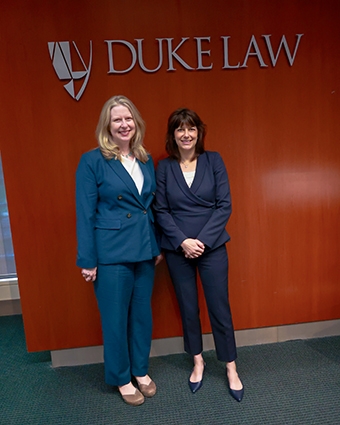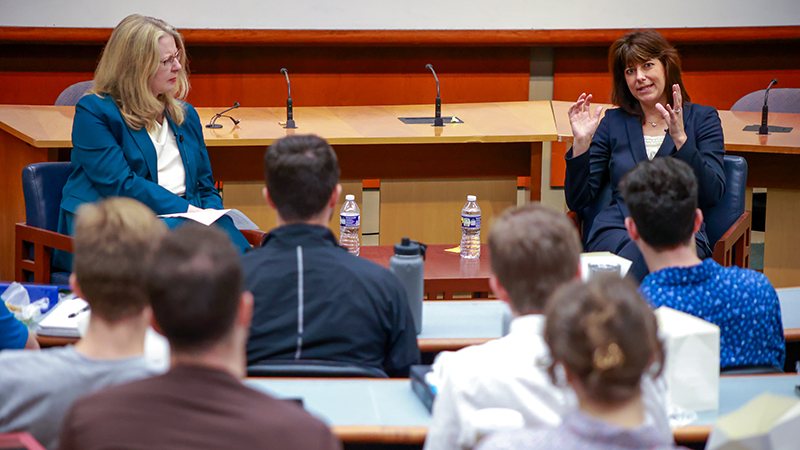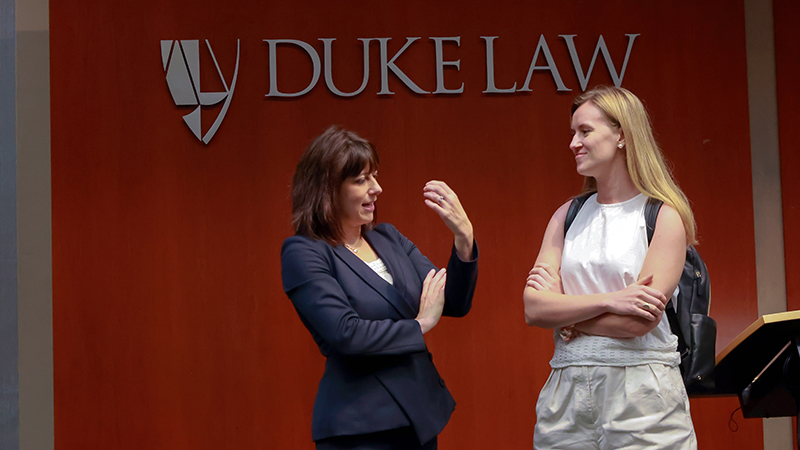Solicitor General Elizabeth Prelogar discusses career, the Court during visit to Duke Law
Prelogar, who spoke with Dean Kerry Abrams in a Sept. 11 “Lawyers and Leaders” conversation, advised students that getting outside of their comfort zones will help them grow as lawyers.
 Solicitor General Elizabeth Prelogar, right, with Dean Kerry Abrams
Solicitor General Elizabeth Prelogar, right, with Dean Kerry Abrams
U.S. Solicitor General Elizabeth Prelogar urged students to “make yourself uncomfortable” during a Sept. 11 event at Duke Law School.
“It’s easy to do the things that you’re good at and the things that are comfortable to you,” said Prelogar, Dean Kerry Abrams’ latest guest in her “Lawyers and Leaders” conversation series. “But when I think about moments in my career and life when I’ve really grown as a lawyer, obviously, but also grown as a person, it is when I’ve pushed myself outside my comfort zone.”
Nominated by President Joe Biden and confirmed by the Senate in October 2021, Prelogar is the 48th solicitor general and second woman to serve as the nation’s chief appellate lawyer. She served as acting solicitor general and principal deputy solicitor general prior to her confirmation, and previously served as an assistant to the solicitor general from 2014 to 2019.
The solicitor general conducts and supervises all Supreme Court litigation on behalf of the United States as well as determining whether the federal government will appeal cases, file amicus curiae briefs, or intervene in cases in all appellate courts. The office was involved in 52 of the 59 cases before the Court last term, including high-profile cases involving redistricting, religious liberty, and the use of racial classifications in college admissions.
Asked by Abrams what it was like to appear before the nine justices so frequently, Prelogar noted that the unique role of the solicitor general’s office in Supreme Court litigation influences the way they conduct their advocacy. She prepares extensively for every case, and she and her colleagues joke that the grey paper on which the government’s briefs are printed by the Court is fitting.
“We want to stand on the force of our logic and the persuasion of our legal arguments, and we want to make sure we are being straight with the Court,” she said. “Because if we lose that trust relationship where the Court can’t count on us to be faithfully representing precedent, or faithfully representing the state of play, the state of law in the lower courts, then that is going to make us far less effective advocates for the United States.”
Prelogar urged students to strive to work with people whom they respect. Noting she is a “big supporter of clerkships,” she said her time clerking for Associate Justices Ruth Bader Ginsburg and Elena Kagan, as well as Attorney General Merrick Garland when he was a judge on the U.S. Court of Appeals for the D.C. Circuit, had greatly influenced her career path.
“It was inspiring to get to sit there and learn about craft from those people and see what arguments resonate with them and how they reacted to different styles of briefing and arguments,” she said. “And to this day, I feel like I started this experience working with those judges and thinking about how to pitch an argument in a brief or how to structure my arguments or what my reasoning for it [should be]… It was really, really awesome to see the way people approach the task.”

Students interested in public service should consider positions in state and local government and public interest organizations in addition to more traditional paths such as the DOJ Honors Program, she said.
Prelogar’s other advice was more personal: She encouraged students to be kind to colleagues and adversaries alike, noting the tradition at the Court of referring to opposing counsel as “my friend.”
“I don’t think there's any fundamental trade-off between being respectful of the other side’s position, being collegial, and also being a fierce advocate for your position,” she said. “And I think actually doing both of those things simultaneously just makes you stronger and better as an advocate.”
Encouraging students to find opportunities that challenge them, Prelogar reflected on her stint as a member of Special Counsel Robert S. Mueller’s team of attorneys investigating interference in the 2016 presidential election and obstruction of justice. Unlike most of her colleagues on the investigation, she had never been a prosecutor, but she said the experience helped her develop new skills, such as how to work under the glare of intense public scrutiny.
“[T]here was a little bit of impostor syndrome for me in the beginning, especially because Mueller hired amazing attorneys from around the [Department of Justice] and across the country who had a deep well of relevant experience to draw from,” she said. “It was an experience that very much pushed me out of my comfort zone, but looking back now I feel I gained so much from that experience that is directly relevant to … my career today.”
Serving as solicitor general, the fourth-ranking official in the Justice Department, is exceptionally demanding, both professionally and personally, Prelogar said. But she recalled interviewing for a job in the office with Michael Dreeben ’81, then the deputy solicitor general, in which he asked her what she would want to do if she could have any position in the law.
“I said I would want to be the solicitor general,” she said. “And, you know, I pinch myself every day now. I can’t believe I am so lucky to have that dream realized, and I recognize a lot of it is luck — to be able to serve in this capacity, at this moment in time, with the stakes of the cases that are coming before the Court.”
The lunchtime event drew a standing room only crowd of students, faculty, and staff.
“The opportunity to hear from Solicitor General Prelogar was incredible,” said Kristen Love ’24. “Her journey to the SG’s office was inspiring, and it was encouraging to hear how she balances her demanding career with family. I’ll definitely keep her advice to embrace every opportunity with me and try out a few of her tips for oral argument.”

Added Casey Witte ’24: “Getting to hear about General Prelogar’s life and career in her own words was a great experience. And as someone who hopes to become an appellate advocate, I appreciated [her] insights on how to practice at the highest levels of the profession while also leaving room for a fulfilling life outside of work.
“Events like these are one of the things that convinced me to come to Duke Law. It’s not every day you get to ask questions to one of the greatest Supreme Court advocates in the country. Here, things like that seem to happen every week or so.”